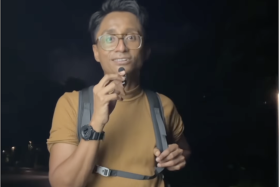Liberal stance on drugs is 'reckless'
Law Minister reiterates S'pore's zero tolerance policy towards drugs at forum
Singapore may boast some of the toughest drug laws in the world but exposure to popular culture, easier travel and easy access to information has raised fears that youngsters here could adopt a liberal attitude to the use of recreational drugs.
Speaking at the Asia-Pacific Forum Against Drugs yesterday, Home Affairs and Law Minister K. Shanmugam reiterated Singapore's zero tolerance approach towards drugs, emphasising the importance of the death penalty and pointing out that a more liberal approach would be dangerous.
In his opening address, he said: "In our view, that is reckless, irresponsible; it is a cop out and it is a step backward."
In a perception survey carried out by the National Council Against Drug Abuse last year, 16 per cent of those in Singapore aged between 13 to 21 found recreational drug use acceptable, compared with 11 per cent in 2013.
Liberalisation of attitudes was one of the factors that led to legalisation of drugs in some parts of the world.
But Dr Kevin Sabet said it was a mistake. On the sidelines of the forum yesterday, the director of the Drug Policy Institute and assistant professor at the University of Florida recounted how he received an e-mail from a mother who told him she was glad that her son was taking cannabis and not heroin.
He said: "Nobody starts with heroin, people always start with the most accessible drugs."
SPIRALLED
The boy in question, now 19, eventually spiralled into heavy drug use and his family has spent hundreds of thousands of dollars in treatment to little effect.
He said stories like these are commonplace in the US state of Colorado, which legalised cannabis in 2012.
Statistics from the World Drug Report released last year do little to ease worries here.
Sources of methamphetamine in East Asia and South-east Asia overtook North America for the first time in 2015.
Of the 3,265 abusers arrested here last year, 41 per cent were under 30.
The total number of drug abusers arrested under the age of 30 have also grown - to 1,341 last year from 1,043 in 2012.
Iceland has moved to stem drug use among the young, and it has seen cannabis use among teens aged 15 and 16 drop to 7 per cent from 17 per cent between 1998 and last year.
Mr Jon Sigfusson, director of the Icelandic Centre for Social Research and Analysis, said that the country's programme is based on analysing protective and risk factors for substance use in children's lives.
Children with constructive leisure activities such as sports were less likely to try substances. The best solution, however, is quality family time.
"Parents are the biggest protective factors in children's lives. It is not just two hours during the weekend, but spending at least an hour every day with your children is important," said Mr Sigfusson.
Get The New Paper on your phone with the free TNP app. Download from the Apple App Store or Google Play Store now

